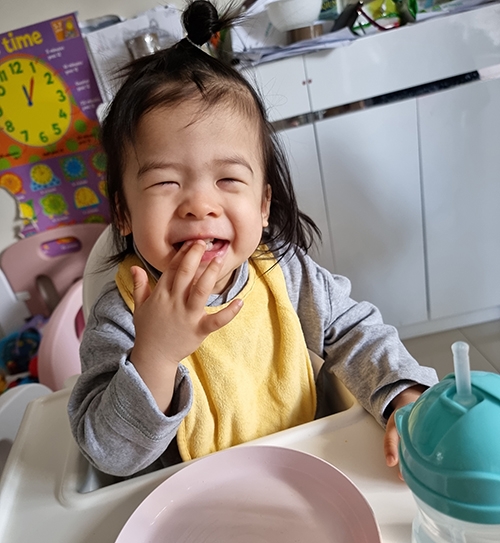Age 2, Cancer (WAGR Syndrome)
Being told their baby was blind was a shock for parents Irene and Jonathan, but the last thing they expected was for it to lead to a diagnosis of kidney cancer.

“I was devastated. I was in that black hole to begin with, and I'd go to sleep, have a nightmare, wake up and feel like this is the nightmare.’’
Abbey’s parents noticed their newborn struggled to open her eyes and hated light. They were told that because she was born early; it was not a concern – but when she was three months old, they took her to a paediatrician who immediately referred them to a specialist. At that point Abbey was diagnosed with aniridia – which is the absence of the iris.
“I didn't understand fully that day what it meant, but I knew it was very serious, because the doctor, I could see it was really hard for her to get the words out,’’ Irene said. “It was basically a diagnosis that Abbey is legally blind. So whatever vision she develops, it's degenerative.’’
As the family struggled to cope with this news, they were in for a second shock as they were asked to complete genetic testing, as aniridia can often be a sign of a serious genetic condition.
“I remember quite well that the professor told us to also get a kidney scan as well,’’ Jonathan said. “We were wondering, how can an eye issue have a connection with your kidney?’’
Abbey was then diagnosed with WAGR syndrome, which is caused by a genetic variation in the DNA that impacts the whole body, including the eyes and kidneys. The main features are aniridia, intellectual disability and cancer. She was then put on a testing schedule for tumours, and the family were told the most dangerous period was the first 18 months. Abbey got kidney cancer (called Wilms tumour) at exactly 18 months.
“It was devastating, but also knowing that we had really good doctors behind us, the renal team, the eye doctors that we've had, and the geneticists, it was reassuring. You’ve just got to keep going on and give her the best life that she can have.’’
Abbey had surgery and still faces ongoing risk of the cancer returning, but her parents are so grateful for the research that they believe saved her life.
“Abbey wouldn't be here without all the research,’’ Irene said.
“The doctors had a plan in place already because of what has happened before and all the research that has been done on this genetic condition. It's so important to support medical research. I would never have known about all this if Abbey didn’t have a Wilms tumour, or WAGR or aniridia. It is very important to support medical research for children.’’


Children’s Medical Research Institute scientist, Dr Liz Connolly, is a practicing oncologist who also works as a researcher and knows how vital it is to keep working towards more treatments and cures.
“Cancer is a truly awful disease, for the person experiencing it and for those who care about the person,’’ Dr Connolly said.
“While great strides have been made, there is still so much to be learned about cancer and improvements in prevention, diagnosis and cancer treatments are urgently needed. There are still many people who do not have effective treatment options and even where treatment is available, many treatments come at the cost of nasty and life-changing side effects. Cancer research is essential to improve the lives of so many people.’’
Jonathan said that without research they may have not found out about Abbey’s cancer until it was too late.
“We could still be in the dark and not know anything about that. And at the end of that, it could be too late. So, we thank the researchers and the supporters. You could save her life and many more lives to come.’’
Watch Abbey's Story

How research is helping kids with cancer, like Abbey
Our world-first ProCan program has created the largest database of cancer information ever and is developing algorithms to help clinicians better diagnose cancers and choose the best treatment for their patient's survival.
Your support of Children’s Medical Research Institute by participating in Jeans for Genes makes all this and more possible.



